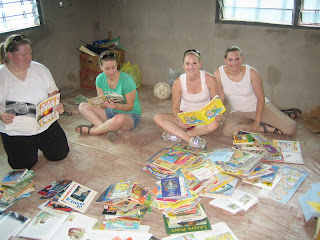Our first Sunday in Ghana was spent at Reverend Eric Annan's church (Shepherd Baptist Church in Accra) and then working with Sovereign Global Mission's feeding program for street children. Attending church services in Ghana was a wonderful experience. Shepherd Baptist Church is a growing church and its permanent building is under construction, so services are held under a tent next door. Aside from the heat (but, when was I not hot and sweaty while in country??), the service was amazing! It was three hours of music, singing, and preaching...but not once, did anyone consult their watch. They were there simply to praise and worship together. Needless to say, it was very different from my Methodist hour for service, hour for Sunday school upbringing.
After church we went to help with the weekly feeding program for street children. Beforehand, Felicia (Eric's wife) took us into an area of shops closed on Sundays where people who are homeless are allowed to sleep. We spoke with a few people on the street with disabilities to get an idea of what sorts of things we could do for them therapeutically on future trips.
The first woman we talked to was unable to walk. She came to Accra from a village in hopes of finding more opportunities to make a living in the city. This seemed to be a common theme as far as learning how people end up living on the streets. Opportunities, especially for those with disabilities, are not available to everyone and people are more or less forced into a life of begging for alms or working for next to no money selling items for someone else. If being forced to live on the street and begging for a living is not bad enough, many individuals (especially children) are sucked into human trafficking, sustaining abuse, and prostitution.
We also had a very enlightening conversation with a gentleman who looked to have been paralyzed from polio in his lower extremities. When we first approached him, he was extremely offended by our presence. After a heated conversation in Twi with Felicia, where she explained that the Obrunis were not there to gawk at the homeless people but to offer help, he was very friendly and willing to talk with us. He explained that he was able to make more money to support his family begging than he would if he was able to sell items. Later in the week we were visiting the Accra Rehabilitation Center (ARC), a government run center where men with disabilities attend daily for 3 years and are taught a skill (such as shoe-making or woodwork) **more on a later post**. We asked him if attending ARC was an option and he all but laughed at the suggestion. He provides the main source of income for his family and this would be lost if he had to attend ARC daily. He also talked about the lack of follow-through provided by the program. Yes, attendees are taught a skill but they are not given materials or money to practice outside of the center. A lack of follow-through was another common theme we encountered while in Ghana. Yes, there are programs and bills in place to address the needs of individuals with disabilities, but if there are no means to monitor progress (or the lack thereof) then the problems will never be resolved. Very frustrating to witness as an outsider...the wheels were constantly turning in our OT brains to try and fix things.
The feeding program was another eye-opening, amazing experience. I realize that I keep using the word amazing, but it seems to be the most appropriate word for our time in country! Upon stepping out of the van, we were ambushed by children all of whom wanted our attention. Stacey did a couple of evaluations while we played with the kids and did some minor first aid. I was taught all sorts of games that Ghanaian children play, including the Obruni dance (pictured below)! This group of street children are sponsored to attend school and Felicia checks up on each and every one of them weekly. The network of street children is huge and there is a definite feeling of solidarity and protection. We realized that while these kids have had to learn lessons well beyond their years, they're still kids and they all just want to be kids. They need love, affection, attention, and play!
It's very hard for me to put into words all of the feelings and emotions that washed through me while on this trip and to effectively reflect and sort through them and this particular day is especially difficult. As I've said previously, the American mentality (and that of the OT profession) is to try and fix anything that is broken. Overcoming that mentality and moving to one of understanding how and why things are the way they are has been a bit of a struggle for me. Again, the question becomes what can I do to help people help themselves? What can I help
them put into place that will actually be sustained? Lots to think on...the mean time, here are some pictures.
 Playing
Playing Teaching the Obrunis to play
Teaching the Obrunis to play
 The Obruni dance!
The Obruni dance!
 Stacey showing off her dance moves
Stacey showing off her dance moves
 Kate practicing her water carrying abilities
Kate practicing her water carrying abilities




























